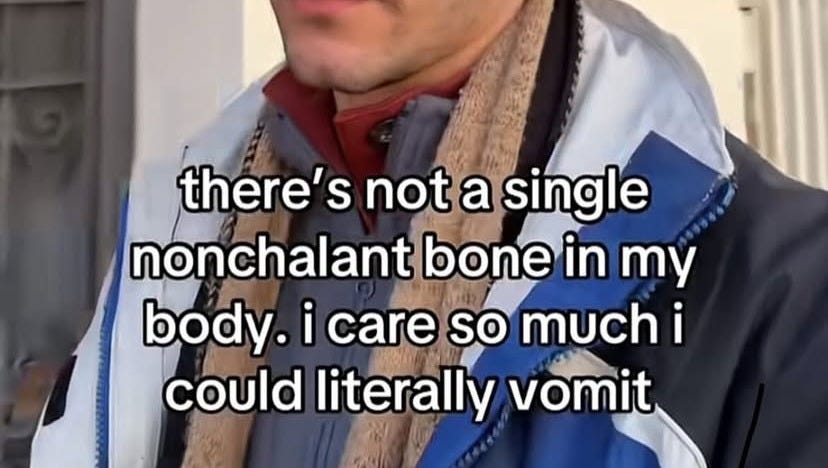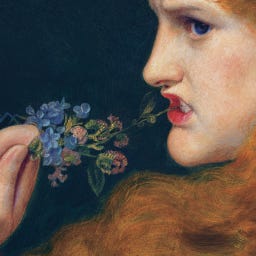In The Mood For Love
A short essay on the perils of dating whilst grieving and decentering romance for friendship
A layer of desperation encases my skin. It began sometime around last summer, after someone I was talking to told me, “Hinge took a backseat” in his life when I apologised for a delay in texting while moving house. We hadn’t been talking on Hinge that long, promptly moving to iMessage, and had met IRL for coffee. For most people, it wouldn't be an issue; we did indeed meet on Hinge. But it was his blasé response, dismissing me as a Hinge match and not as someone he’d been getting to know for almost two months, that set something off in me. Instead of bringing it up, I just replied with a “haha, yeah it’s been a while” and tried to repair the talking stage as it fizzled out.
I’m not telling you about this blip in my dating life as a way to shame said guy or rid my body of any lingering rage it’s holding onto, but it’s an example of me ignoring my needs for the mere chance of love. We were clearly incompatible, not interested in keeping dates with each other, constantly back-and-forth rescheduling. Most importantly, I was actively grieving my mother’s passing, which took place less than 9 months before. Yet, I pushed all that aside to make it work. Nothing forced me to do this, no parental yelling about marriage or friends shaming me for being single. It was an urge that came from within as if someone had planted it there from birth. When it eventually blew up in my face, as dating so often does, I sat with myself and pondered what had gone wrong. I tried hard, and I was always pleasant. I was usually on time and often even too eager to talk. I arrived early for our date, and we seemed to hit it off. So what was it? Obviously, these things happen, and people just don’t work out for whatever reason. Still, I resented myself deeply. Most of all, I felt guilty that my grief had been the reason I had ended things, despite all the obvious signs it wasn’t going to work anyway.
When I tell friends, acquaintances, and even strangers the sheer number of times this exact scenario (give or take a few details) has reoccurred in my dating life over the last year, they often think I’m exaggerating. Perhaps, to some extent, I play it up for comedic effect to ease the growing anxiety I’ve been harbouring that I might be an unsuitable candidate for love. How many times have I made myself available for someone who wasn’t worth the sacrifice? How many times have I felt a twinge in my gut that I perhaps should take silence not as an admission of dislike or disgust but of simple indifference? And, in all honesty, how many times have I turned an interaction into something it wasn’t just because I’m hellbent on romanticising it as a way of making life more tolerable?
The older I get, the harder I find it to determine if the romantic choices I’ve been making are a reflection of my actual wants and desires. Acknowledging that I’ve attempted to settle feels like admitting defeat. It's like I’m holding up a giant neon sign that reads ‘THIS WOMAN IS BROKEN’. However, I think the crux of it is that I desperately want something or someone to make me whole again. Maybe that’s wrong. I don’t believe I’ve intentionally used dating as a band-aid for my grief, but the timing sure doesn’t help my case. At times, I felt ashamed to even think about dating whilst grieving, but at what point do you get up and say, ‘I’m fixed enough now, please love me’? Is it a year after grief? Two, three? Do I remain single for the next ten years in hopes I therapise myself enough to the point of being a woman without a single dent? How soon do I confess that I’m grieving? Am I being too forward if I wait until I eventually make the blunder of explaining that my mum is dead, even though I spoke about her as if I saw her yesterday? Is it leading them on, misleading them into thinking I’m an easy person to manage, or am I just so burnt out by endless bad dates that I’ve forgotten normal, or even good ones, still exist? Still, I can see the light go out in their eyes when the words leave my mouth; the Haaniyah of five minutes ago no longer exists. It’s replaced by an atmosphere of suffocating pity, a hand squeeze that makes me feel like I’m a placated five-year-old or a dying dog—I can’t tell which option is worse.
I suppose the hurt, confusion and all the mess in between is less about them and more about me. I shouldn’t internalise, but I continue to do so—to the point that I started crying whilst building dining chairs and listening to Fall Out Boy (a real Wednesday night activity from last week). I know someone being cruel isn’t a reflection on me. I know someone ghosting me isn’t a reflection of me. And most importantly, I know it’s not their fault if they’re not ready to take on grief. I know, I know, I know, but god, can't I just experience dating without the added hurt? Why can’t I come home giddy with excitement that I’ve met someone special or with butterflies in my stomach (that don’t mimic anxiety)? There are only so many times I can tell jokes about my love life until it stops being funny and starts to read like Jo March in Little Women pleading about her loneliness to her mother.
I am so lonely.
I know that I’m not literally alone—I have plenty of friends who love me, friends who I have dinner with, go to museums with, spend hours in the dancery with, complain about films with and even friends who have sat beside me during the worst moments of my life. I know I’m not a bad judge of character because my friends are some of the kindest, funniest and most genuine people I’ve had the pleasure of meeting.
I know that because my friends love me, I am a lovable person who has the capacity for care and compassion as well as love. But as much as I hate to admit this, fearing ungenerous accusations of ‘centring romance’, it’s not the same. Despite all the words I’m writing right now, I can’t precisely explain why. Perhaps that’s the issue. I find it hard to describe to people who have not experienced grief. I don’t want to suggest I’ve gained access to a higher level of emotional mastery, but after my mum died, something that can only be described as a black hole started whirling around inside of me. I became an endless pit desperately in need of validation, affirmation and, most importantly, love. But what is it about romantic love that I perceive as the sickly sweet medicine to my specific ailment?
It wasn’t romantic love that sat beside me at my mother’s funeral and consoled me afterwards. It hasn’t been romantic love that’s celebrated my achievements time and time again. Romantic love doesn’t listen on the phone, as I question my career goals and whether or not my writing is a worthwhile pursuit. But my friends have. That pity I spoke about feels nonexistent with them; no light goes out because their eyes remain fixed on me, seeing me for who I am and not what I could be if a date went well. I do not want to be a cynic about romance, but I wonder if it’s time to start being more realistic about where I’ve been ranking romance over friendships, even if unintentionally. This is not so much about decentering men as it is decentering romance and decentering my wish that romance will fix me, because the reality is that nothing can fix me. Not even time and the best therapist around could eliminate the level of devastation I feel, so how could a relationship? I keep forgetting that relationships aren’t meant to fix me—they’re meant to be a complement to the other elements of my life. I seem to have missed the memo.
I’m unsure what this grand realisation means for me going forward. Is there some sort of prize for reclaiming your agency, or is peace of mind good enough? Maybe all my effort and desire for a great date could be put towards something worthwhile, perhaps a rom-com script or a romantic novel, because, god, don’t we need more of those from self-described ‘hopeless romantics’? A more realistic outcome than a 90,000-word manuscript would be the sanity and peace I’d gain, not using dating as a way to make fun of myself. I’d feel better talking about myself beyond another story of how I was fucked over, beyond the feeling that being constantly fucked over has made me into a worse person. As one of my best friends said to me during our brunch today, “Haan, you need to tap out, it’s driving you crazy”. Much like my other friends, Ren has spent more than their fair share of time listening to me complain down the phone. And I fear, like always, they’re right. Dating is driving me crazy, and I’m finally over it. Godspeed to you all.
This essay is a little out of nowhere for me. Thank you, Ren, for your inspiring brunch talk and thank you to all my wonderful friends.
And a special thanks to the wonderful Emma Tranter for making my words make sense. She’s also a fantastic writer on this website:





I have really been trying to not look at relationships as a way to “fix”. Hard but necessary especially to build a good foundation and not form codependency or enmeshment 🤍
loved loved loved loved loved